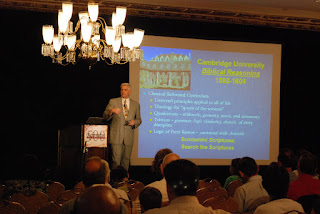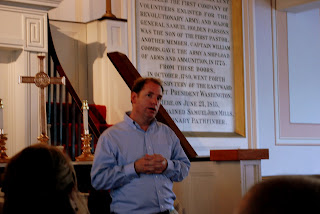
by Stephen Horn base on Stonewall Jackson by Robert Lewis Dabney.
Stonewall Jackson was a Christian and he was also a great general for the confederates in the second war for American independence. He led many campaigns one of which saved Richmond. He understood his enemies, and he made defensive and offensive acts accordingly. Three of the qualities that he possessed which made him a good general were perseverance, hard fighting, and no fear of the enemy. He persevered and fought hard, and he did not fear the enemy. Because of these things he was the opposite of Generals like McClellan , who even when he had a copy of the Confederates plans did not act on them soon enough. He was not like others, like Rosecrans who would not attack because they thought the enemy more numerous(even though in that case they were not.) He was not like Bragg either, who once he had invaded to the enemies rear retreated with his spoils and let the enemy have it back.
One quality Jackson had that made him a good general, was that he persevered and did what he thought needed to be done. When necessary, he would make his troops march at double quick half the night to get to an important position. “[The troops] hurried forward, often at double quick, waded the Shenandoah River, which was waist deep to the men, ascended the Blue Ridge at Ashby’s Gap, and, two hours after midnight, paused for a few hours rest at the little village of Paris, upon the eastern slope of the mountain.”1 But his troops were patriots and would heartily obey his orders, and he also returned the respect. After a long march, “an officer came to Jackson, reminded him that there were no sentries posted around his bivouac, while the men were all wrapped in sleep, and asked if some should be aroused, and a guard set. ‘No,’ replied Jackson, ‘let the poor fellows sleep; I will guard the camp myself.’”2 Forced marches were his policy, and thus his own brigade was called foot calvary for how fast they marched. He used this in his Valley Campaign, and also when he was part of Lee’s army. When he needed to get to somewhere before the enemy, his troops would march quickly, and get there before the enemy. His policy was to move quickly, strike hard, and secure the fruits of victory before he could be crushed.
After he made a forced march, Jackson would strike the enemy hard. At the battle of Port Republic, the enemy held an important bridge. The Federals had one field piece to sweep the bridge, and another replying to the confederate artillery. Jackson, “without pausing to wheel them into line, as [his troops] came with in an effective distance, he commanded them, with a tone and mien of inexpressible authority, to deliver one round upon the enemy’s artillerists, and then rush through the bridge upon them with the bayonet. They fired one stinging volley, which swept every cannoneer from the threatening gun, and then dashed with a yell through the narrow avenue.”3”[T]he bridge was gained, and the enemies gun was captured.”4 But, this gallant charge did take men from the ranks. Jackson knew that this was going to happen, but he also knew that if he did not take the losses he could not hold his position. It was necessary because the enemy was between him and his baggage, and he needed to drive the enemy out.
Another quality Jackson had was that he did not fear if the enemy had greatly superior numbers. If he thought that he could not win a battle he would not fight it. But, if the enemy outnumbered him, he would try to outsmart the enemy by flanking him, and other military maneuvers. If the enemy was panicking, he would use a frontal assault to make them flee. He understood military tactics since he had studied them extensively at West Point. At Chancellorsville, he executed one of the most brilliant maneuvers of the war, which was marching around to the enemy's flank while he left a skeleton force to keep the enemy in his entrenchments. This same maneuver was tried in the Battle of the Seven Day’s, but from lack of coordination it did not nearly have the effect that it did at Chancellorsville. Stonewall Jackson said, “Captain, my religious belief teaches me to feel as safe in battle as in bed. God has fixed the time for my death. I do not concern myself about that, but to be always ready, no matter when it may overtake me. That is the way all men should live, and then all would be equally brave.”
From this we see that some of his most influential characteristics which he had upon his campaigning were perseverance, hard fighting, and no fear of the enemy. He fought hard because he did not fear what the enemy could do to him. He persevered even when the enemy was much stronger than him. This shows that his lack of fear was the important quality which he had, because all of his other qualities sprouted from this quality. He had that quality because he was a Christian, and he feared God more that his enemies.
1 Robert Lewis Dabney, Stonewall Jackson, (Virginia: Sprinkle Publications) p. 212
2
Ibid p. 212
3
Ibid p. 412-413
4
Ibid p. 413
Buy The Book











































